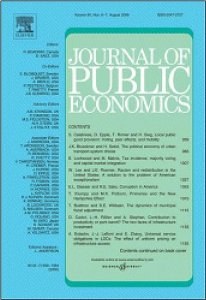
Gerritsen, A. (2016). Optimal taxation when people do not maximize well-being Journal of Public Economics, 144:122--139.
-
Affiliated author
-
Publication year2016
-
JournalJournal of Public Economics
I derive the optimal nonlinear income tax when individuals do not necessarily maximize their own well-being. This generates a corrective argument for taxation: optimal marginal taxes are higher (lower) if individuals work too much (too little) from a well-being point of view. I allow for multidimensional heterogeneity and derive the optimal tax schedule in terms of measurable sufficient statistics. One of these statistics measures the degree to which individuals fail to optimize their labor supply. I empirically estimate this by using British life satisfaction data as a measure of well-being. I find that low-income workers tend to work {\textquoteleft}too little{\textquoteright} and high-income workers {\textquoteleft}too much,{\textquoteright} providing a motive for lower marginal tax rates at the bottom and higher marginal tax rates at the top of the income distribution.